'The Chinese thought India would back off.'
'They did not expect such a firm Indian response to their expansionist manoeuvre.'
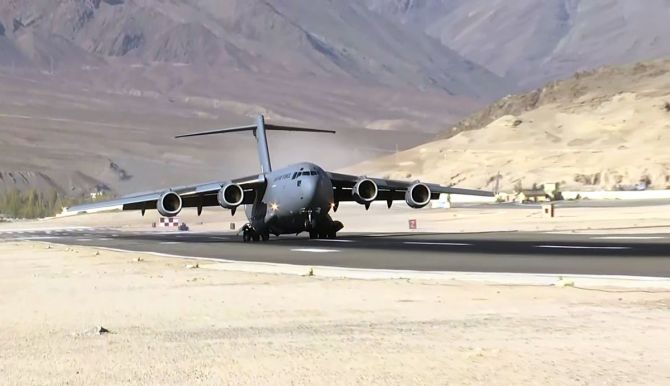
"The LAC standoff is becoming a key determinant in the post-Covid world order." Lieutenant General Subrata Saha (retd) -- former Deputy Chief of the Army Staff, former General Officer Commanding XV Corps and member of the National Security Advisory Board -- tells Rediff.com's Archana Masih in part two of a detailed interview.
What do you think is the Chinese end game?
I don't think they are looking for an end game at this juncture. A series of Chinese adventures on LAC have misfired.
They came in and turned their exercise into an expansionist military manoeuvre, but were taken by surprise by the response from the Indian Army.
Secondly, they never expected they would get such a fierce reply in Galwan.
Thirdly, the Indian Army thwarted Chinese designs in South Pangong Tso.
US intelligence reports indicated that a PLA colonel was sacked because he refused to go into South Pangong Tso. That officer on the ground had seen what had happened in Galwan and must have decided not to go beyond a point. This gives an indication of what is playing on the Chinese mind.
Therefore, more than an end game, the Chinese have to either think about a face saving exit from the mess they have got into or decide if there is a case for escalation.
Do you detect Chinese shock at the firm Indian military response?
The Chinese are facing a strategic dilemma. They thought India would back off, but did not expect such a firm Indian response to their expansionist manoeuvre. Hence they are confronted with a dilemma from which they have to find a way out.
They are trying everything in their arsenal -- whether in terms of information war or economic war or diplomatic war -- they are using all elements of State power to make it more and more difficult for India. That is why India is also exploring all possibilities.
There is also an economic imperative which constitutes a part of the Chinese belligerence.
Similarly, in the information domain, there is constant propaganda from that side, but people have become wiser and don't get swayed by it.
In fact, I feel public opinion is swaying to the contrary. Look at how the people of India responded on Taiwan's national day.
Have you ever seen so much support for Taiwan in the past? The government may not have made a statement, but people of the country have made a bold, categoric and pronounced statement.
If China is launching an information war against India, the Indian people are countering that warfare in their own manner and rattling their info warfare mechanism.
At the same time, people are also upset with China in regard to the Covid pandemic which without doubt started from China.
The mood therefore is to take China on.
China, meanwhile is using Pakistan and trying to get Nepal, Bangladesh and Sri Lanka to do their bidding.
China is trying everything within its means to put pressure on India.
As of now, I don't see an end game, but the intent is quite clear, which is to somehow degrade India's influence in the region and internationally.

How do you see the next few months unfolding in this continuing standoff?
It is difficult to forecast where does it lead. The Indo-Pacific strategy is gaining momentum. After France, Germany has announced its strategy and there seems to be a policy shift in the UK vis a vis India.
Therefore, we are seeing a distinct shift -- the LAC standoff is actually becoming a key determinant in the post-Covid world order.
The PLA action on LAC has shown the Chinese intent to the rest of the world.
The US elections will also have a bearing on the unfolding situation.
The 2+2 meeting between India and US later this month is not going to be virtual. US Secretary of State Mike Pompeo will most probably meet the prime minister when he comes to meet his Indian counterpart.
Have such large number of troops been sustained for such a long period in such extreme conditions before? Has it happened in any military theatre before?
India has had a long experience in high altitude extreme weather warfare.
We have been deployed in the Siachen glacier for decades. I served as company commander for six months in 1986 when we didn't have the kind of clothing and equipment that troops have now -- but even then, we were able to withstand those conditions and sustain ourselves very well.
There are multiple reasons for that:
The level of motivation
It is an all-volunteer army
Military leaders lead from the front
You will never see a company without a company commander or a battalion without a battalion commander. The brigade HQ is also deployed right in front.
A brigade that I commanded in the Keran sector in Kashmir used to come under Pakistani shelling.
We also have the experience of fighting the Kargil war in extreme weather and terrain. Our troops have an inbuilt resilience that has come over the years in the Indian Army.
The development of infrastructure, like the opening of the Rohtang tunnel is going to make a marked difference in transportation and will give a certain amount of relief from maintenance by aircraft.
The ability to keep the roads open has improved considerably and this will help in keeping the supply chains open.
But all this comes at a cost. In spite of the improvements and enhanced facilities, there will be health cost.
In these very extreme conditions, besides fighting the enemy, soldiers are also fighting the weather despite acclimatising themselves.
It is a huge challenge for our doctors as well. Our doctors are going to have a major role to play along the LAC.
Normally, there is one doctor in a battalion, but on LAC every company has an MBBS doctor. The presence of a doctor is such a morale booster because troops have the reassurance that they have a doctor to take care of them in the crucial golden hour.
The doctor is also fighting a war because he has hundreds or thousands of troops to take care of.

What are some aspects that the Indian military has be very cautious of in the days ahead?
We have to be more effective in our surveillance and early warning. Let us not wish away the fact that the Chinese have taken some very good strides in technology, therefore we don't want to be taken by surprise.
With a forward disposition and increased number of Chinese troops on our border, we have to be very careful with our winter disposition so that they don't get any edge over us in technology. Our winter surveillance has to be very effective.
In these five months, has China increased the spectrum of war?
With the sudden excitement about Gilgit-Baltistan, China is trying to put pressure on the minds of the leaders.
Like the proverb 'battles are won or lost in the minds of the leaders', the aim is to put pressure on the leadership of the adversary that it starts to balk.
Suddenly, Nepal has decided to increase the number of border posts. China is trying to make forays into Bangladesh, Sri Lanka, the conference call between foreign ministers of Afghanistan, Nepal, Pakistan, China.
These are methods to put pressure on the adversary. That is how they are trying to enlarge the spectrum of war.
What is the possibility of Xi Jinping and Narendra Modi interacting with each other on this issue?
The next meeting of major powers is the G20 which is virtual. Dokalam was resolved on the sidelines of one such meeting between the heads of States.
But between Dokalam and now, the trust levels are at their nadir. During Dokalam there was a reasonable trust level, but that has changed completely.
Therefore, if a breakthrough has to happen, it will probably happen at that level. When, how, under what conditions and keeping in mind this complete trust deficit, we have to see how it unfolds.
Feature Presentation: Aslam Hunani/Rediff.com
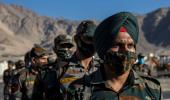



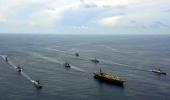




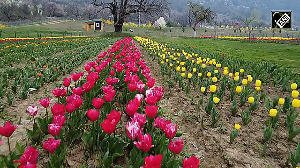
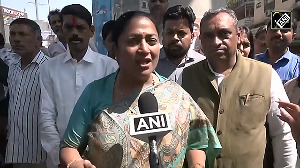
 © 2025
© 2025